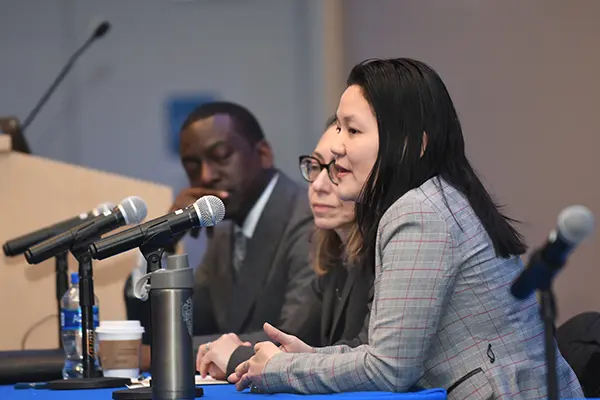NSF Grant Funds Study of Plea Decisions
 Image by Tory Wesnofske
Image by Tory Wesnofske
02/20/2019
By Katharine Webster
There’s a heavy hand on the scales of justice – one that causes innocent defendants to plead guilty in large numbers, according to Asst. Prof. Miko Wilford.
That heavy hand is the power of prosecutors to offer dramatic “sentencing discounts” in return for a guilty plea, Wilford says.
Before the 1980s, about 20 percent of criminal cases went to trial, but now fewer than 5 percent do. The change was fueled in part by the passage of mandatory minimum sentence and “three strikes” laws. Now, the pressure is greater than ever for defendants to plead guilty rather than risk a conviction at trial, even when they are innocent, she says.
“When a defendant is facing a 55-year mandatory minimum sentence and the prosecutor offers him a plea deal for 15 years, he is essentially being punished for exercising his constitutional right to a trial,” she says.
Wilford, a psychology professor, was just awarded a five-year, $498,000 National Science Foundation CAREER grant to study how people make plea decisions. She hopes to restore some balance to the scales, doing research to inform policy changes that will reduce the number of false guilty pleas, especially by juveniles who don’t fully comprehend the consequences.
“Juveniles are more prone to falsely plead guilty,” she says. “Defense attorneys spend less time with juvenile clients because juveniles are less likely to assert themselves. Juveniles are more susceptible to pressure from prosecutors and other adults. And, even though there are protections in place for juveniles, at the end of the day, it’s their decision whether or not to plead guilty, even if they’re lucky enough to have both parents involved and their parents encourage them not to.”
The NSF grant builds on Wilford’s previous research, including her collaboration with Asst. Prof. Misha Rabinovich in the Art and Design Department and several students to create an online, animated plea-deal simulation.
In the demo version at PleaJustice.org, research participants “play” as a female driver who is charged with hitting a parked car and then leaving the scene of the accident. Some participants then see a flashback scene in which they “remember” hitting the car, while others see a flashback that indicates they are innocent.
 Image by Jordanne Love and Misha Rabinovich
Image by Jordanne Love and Misha Rabinovich
Then they’re offered a deal by the prosecutor: probation and a fine for a guilty plea, compared to jail time and higher costs if they reject the plea offer and they’re found guilty at trial. After choosing one or the other, they’re asked to explain the reasons for their choice.
Wilford’s pilot study yielded results similar to live, in-person experiments: Deep sentencing discounts, coupled with the prosecutor’s claim to have evidence showing the suspect at the scene, lead a significant number of “innocent” people to plead guilty.
The more advanced version of the simulation that Wilford and Rabinovich are now developing includes a second crime scenario involving a shoplifting charge. Participants will start the simulation by creating an avatar who resembles them, which previous research shows enhances participants’ engagement. Also, they will get advice from a defense attorney before making a decision.
Wilford will be testing variables that change the likelihood of a guilty plea, including the defendant’s age and the difference between the plea offer and the penalty for a conviction at trial. She will administer the simulation either online or in-person to three different groups: college students, adults who are recruited online and adolescents at the Boys & Girls Club of Greater Lowell.
Using the juveniles’ feedback, she also will develop an educational version of the software that defense attorneys can use to help juveniles understand their rights and how to assert them – as well as the consequences of pleading guilty or choosing not to under different scenarios.
“Juveniles really need to be examined with their own microscope,” she says. “Developmentally, there’s a disconnect between juveniles saying they understand that they have a curfew, for example, and connecting that to concrete consequences, like not being able to go to their junior prom.”
Wilford is joined on the grant by Asst. Prof. of PsychologyJoseph Gonzales, for his statistical expertise, Education Prof. Jill Lohmeier, who will help with educational evaluation, and Kelly Sutherland, a first-year Ph.D. student in applied psychology and prevention science.




